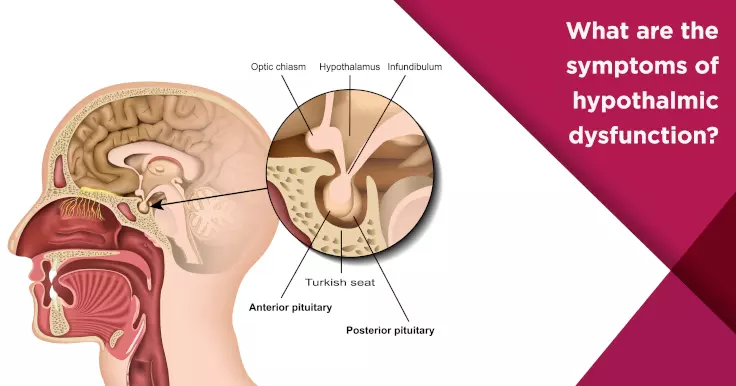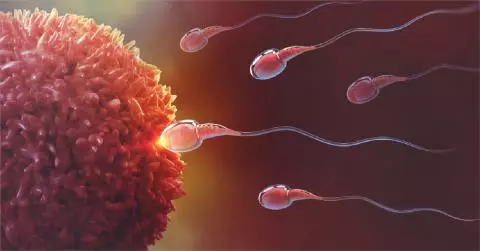Hypothalamic Dysfunction Symptoms: Impact on Reproductive Health

The hypothalamus is a small part of the brain next to the pituitary gland. Hypothalamus is responsible for the production of hormones that regulate mood, body temperature and hunger. It also has an effect on the functioning of the pituitary gland. The hypothalamus controls the production of hormones by this gland. This, in turn, has an effect on the functioning of the thyroid gland, adrenal glands, ovaries and testes.
What is Hypothalamic Dysfunction?
A condition wherein the hypothalamus does not produce hormones is known as hypothalamic dysfunction. Given the role these hormones play in the functioning of various other organs, hypothalamic dysfunction affects a person's body clock, sex drive, emotions, behaviour and weight. In the case of women, it also affects their ability to produce breast milk and childbirth.
Symptoms of Hypothalamic Dysfunction
This condition does not affect everyone in the same way. The symptoms it causes are mostly dependent on the different hormones not being produced and the organ it affects. Thus the signs and symptoms of this condition vary from person to person.
Symptoms of Hypothalamic Dysfunction in Children
Children diagnosed with this condition may have stunted growth. On the other hand, they may also have excessive growth spurts. If the condition develops at a very early age, they may experience an early onset of puberty or a late onset of puberty.
Symptoms of Hypothyroidism Caused by Hypothalamic Dysfunction
Hypothalamic dysfunction can cause hypothyroidism or the lowered production of thyroid hormones. In such cases, hormone replacement therapy for the thyroid hormone may not have any effect on the symptoms being seen. Most of these patients are overweight or obese. Other common symptoms include:
- Depression
- Changes in skin or hair
- Intolerance of cold
- Fatigue
- Constipation
- Hoarseness
In terms of fertility, a man may become impotent because of the effect hypothalamic dysfunction has on the thyroid gland. Similarly, women may have irregular menstrual cycles. This can be a problem for couples trying to have a family.
Symptoms of Low Adrenal Caused by Hypothalamic Dysfunction:
The Adrenal glands produce a number of hormones that help control blood sugar, blood pressure, etc. They do this by producing hormones such as mineralocorticoids, glucocorticoids and adrenal androgens. If the production of these hormones is restricted, the person may experience:
- Difficulty regulating body temperature
- Fatigue
- Dizziness
- Obesity
- Uncontrolled urination
- Excessive thirst
- Emotional problems
Symptoms of Tumours that Cause Hypothalamic Dysfunction:
The symptoms seen in cases of hypothalamic dysfunction also depend on the factors causing it. Tumours in the hypothalamus are one of the common reasons for this condition. These tumours can put pressure on the optic nerve and cause loss of vision and frequent headaches. Tumours in the hypothalamus can also cause temporary euphoric sensations and hyperactivity.
Symptoms of Kallmann Syndrome
Kallmann syndrome is a genetic disorder associated with hypothalamic dysfunction. Some of the symptoms are:
- Loss of smell
- Late onset of puberty or failure to start puberty
- Primary amenorrhoea
- Undeveloped testicles
- Low levels of LH and FSH gonadotropins
- Ill-defined secondary sexual features
- Infertility
If you have any of these symptoms, consult a doctor right away.
 Infertility Counselling
Infertility Counselling Female Infertility Treatment
Female Infertility Treatment Andrology Treatment
Andrology Treatment Fertility Enhancing Surgeries - Female
Fertility Enhancing Surgeries - Female Fertility Enhancing Surgeries - Male
Fertility Enhancing Surgeries - Male Endoscopy Treatment
Endoscopy Treatment IUI Treatment
IUI Treatment IVF Treatment
IVF Treatment ICSI Treatment
ICSI Treatment Advanced IVF Solutions
Advanced IVF Solutions Embryology
Embryology Vitrification Egg, Embryo, Sperm Freezing
Vitrification Egg, Embryo, Sperm Freezing Preimplantation Genetic Testing (PGT)
Preimplantation Genetic Testing (PGT) Donation Program Embryo / Egg / Sperm
Donation Program Embryo / Egg / Sperm Self-cycleTM IVF
Self-cycleTM IVF

 Self-cycleTM IVF
Self-cycleTM IVF










